Happy Birthday, Artie Auerbach!
It was a cold January day in 1946 when Jack Benny, attending the Rose Bowl game, made the acquaintance of a hot dog salesman who enthusiastically peddled his wares with a cry of “Pickle in the middle and the mustard on top!” The salesman tells the notoriously tight Benny that the dogs are three cents apiece, and when Jack asks why he sells them so cheap the vendor’s reply is “Taste ’em!” (At least he’s an honest man—when his would-be customer notices the weenies look a little tough he responds: “Hoo hoo hoooo…what suitcase handles they would make!”)
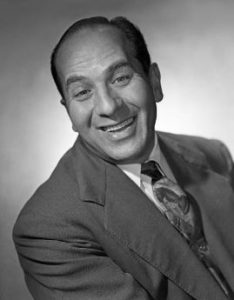 Now…before we confuse anyone—this historic meeting occurred on Jack’s radio show…not in real life. But Benny’s encounter with the vendor would be a most momentous one—for although he’s not identified specifically by name in that broadcast, that tube steak proprietor would soon become a regular on Jack’s program in the form of the comedian’s good friend “Mr. Kitzel.” Kitzel was performed by the talented Arthur “Artie” Allan Auerbach, born in 1903 on this date in New York City…and before achieving radio immortality, was a professional photographer by trade.
Now…before we confuse anyone—this historic meeting occurred on Jack’s radio show…not in real life. But Benny’s encounter with the vendor would be a most momentous one—for although he’s not identified specifically by name in that broadcast, that tube steak proprietor would soon become a regular on Jack’s program in the form of the comedian’s good friend “Mr. Kitzel.” Kitzel was performed by the talented Arthur “Artie” Allan Auerbach, born in 1903 on this date in New York City…and before achieving radio immortality, was a professional photographer by trade.
The photography practiced by Artie Auerbach was that of the newspaper variety; the periodicals that employed him at various stages of his fourth estate career include The New York Graphic, The New York Daily Mirror, and The New York Daily News. Auerbach covered such headline stories as the Hall-Mills murder case (1922) and the Lindbergh Baby kidnapping (1932), but in his off-time Artie demonstrated that he had a knack for dialects by telling Yiddish anecdotes at private parties. The story goes that Auerbach found the inspiration for the “Kitzel” character by hearing druggist Maurice Ahdorf warble Yes Sir, That’s My Baby in a strong accent (not necessarily Jewish, as many believe, but rather a combination of Balkan tongues). Artie would eventually cross paths with radio comedian Phil Baker, who enjoyed Auerbach’s dialect humor so much that he recommended him to his friend Lew Brown. In 1934, Brown was casting for a stage revue entitled Calling All Stars, and signed Artie up for the show (as a hillbilly!). Auerbach apparently had reservations about a career in show business, because rather than quit the newspaper outright…he just took a leave of absence.
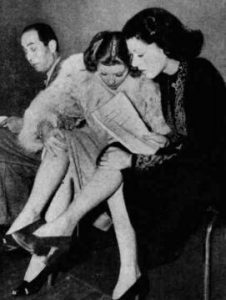 Artie Auerbach wound up taking quite a few furloughs. He worked on Baker’s show until the fall of 1936, when he was hired by Milton Berle for The Gillette Community Sing. Artie then made his way to Eddie Cantor’s Texaco Town and, in the fall of 1937, went to work for Jack Haley on first The Log Cabin Jamboree and then The Wonder Show. The Wonder Show featured both Lucille Ball and Gale Gordon (as announcer), but it was Lucy’s cousin Cleo Manning (also in the cast) that caught Artie’s eye. The two of them would later wed, and Lucy put her Jane Hancock on the wedding certificate as a witness.
Artie Auerbach wound up taking quite a few furloughs. He worked on Baker’s show until the fall of 1936, when he was hired by Milton Berle for The Gillette Community Sing. Artie then made his way to Eddie Cantor’s Texaco Town and, in the fall of 1937, went to work for Jack Haley on first The Log Cabin Jamboree and then The Wonder Show. The Wonder Show featured both Lucille Ball and Gale Gordon (as announcer), but it was Lucy’s cousin Cleo Manning (also in the cast) that caught Artie’s eye. The two of them would later wed, and Lucy put her Jane Hancock on the wedding certificate as a witness.
In his early radio years, Artie Auerbach’s character eschewed formalities and simply went by “Kitzel.” He did, however, establish a catchphrase—”Hmmm…could be!”—which he brought with him to his next radio gig, as a regular on Al Pearce and His Gang. He’d spend two years on Pearce’s show (and play “Kitzel” in the 1943 Republic motion picture release Here Comes Elmer, starring Al, Dale Evans, and Gang regulars Arlene Harris and William “Tizzie Lish” Comstock) before embarking on a tour of Army posts and Navy boot camps. Auerbach returned before the microphones in October of 1944 as a regular on The Abbott & Costello Program, and then (in January of 1946) made his home on Jack Benny’s show.
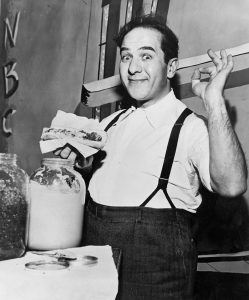 During Radio’s Golden Age, much humor was mined from dialect comedy and Jack’s show was no exception. In the 1930s, second banana Sam Hearn played a Yiddish gentleman named Schlepperman (“Hullo, stranzer…”) who even made the rounds on such shows as Fibber McGee and Company and The Great Gildersleeve. (When Hearn returned to work for Benny in the late 40s, Jack advised him that he couldn’t revive the Schlepperman character due to Kitzel’s popularity…so Hearn became the man from Calabasas who always greeted the comedian with “Hiya, rube!”) Though not particularly enlightened when looking through a modern day-lens, it should be noted that the laughs Mr. Kitzel got from audiences were never born of malice. His gentle humor relied on the character’s malapropisms (much like the “Pansy Nussbaum” character Minerva Pious played on Fred Allen’s show). For example, Mr. Kitzel could be discussing his love of baseball and in naming his favorite players would reference “Rabbi Maranville” — prompting Jack to correct him by saying he means ‘Rabbit’ Maranville. “Him I never heard of,” Kitzel would reply with a shrug. (We should also point out that Kitzel was one of the rare individuals that wouldn’t disparage the long-suffering Benny in the way that, say, Mel Blanc or Frank Nelson would.)
During Radio’s Golden Age, much humor was mined from dialect comedy and Jack’s show was no exception. In the 1930s, second banana Sam Hearn played a Yiddish gentleman named Schlepperman (“Hullo, stranzer…”) who even made the rounds on such shows as Fibber McGee and Company and The Great Gildersleeve. (When Hearn returned to work for Benny in the late 40s, Jack advised him that he couldn’t revive the Schlepperman character due to Kitzel’s popularity…so Hearn became the man from Calabasas who always greeted the comedian with “Hiya, rube!”) Though not particularly enlightened when looking through a modern day-lens, it should be noted that the laughs Mr. Kitzel got from audiences were never born of malice. His gentle humor relied on the character’s malapropisms (much like the “Pansy Nussbaum” character Minerva Pious played on Fred Allen’s show). For example, Mr. Kitzel could be discussing his love of baseball and in naming his favorite players would reference “Rabbi Maranville” — prompting Jack to correct him by saying he means ‘Rabbit’ Maranville. “Him I never heard of,” Kitzel would reply with a shrug. (We should also point out that Kitzel was one of the rare individuals that wouldn’t disparage the long-suffering Benny in the way that, say, Mel Blanc or Frank Nelson would.)
 Auerbach’s “Kitzel” was a hit with audiences from his very first appearance on the Benny program. In fact, Benny scribe John Tackaberry and songwriter Carl Sigman turned Kitzel’s “Pickle in the middle” chant into a novelty song in 1946 that was recorded by both Artie and Louis Prima. Kitzel also popularized “hoo hoo hoooo!”, which he would say to Benny whenever he needed to punctuate a joke. The Mr. Kitzel character soon became such an integral presence on Jack’s program (though they were careful not to use him every week, for fear he’d get stale) that he transitioned to several appearances on Benny’s TV show, too. (There was even an audition for a Kitzel radio spin-off entitled Here Comes Mr. Kitzel, which was produced in December of 1950 and a copy survives today.) His last show business credit was a Benny telecast that aired posthumously; Artie Auerbach succumbed to a heart attack at the age of 54 in 1957.
Auerbach’s “Kitzel” was a hit with audiences from his very first appearance on the Benny program. In fact, Benny scribe John Tackaberry and songwriter Carl Sigman turned Kitzel’s “Pickle in the middle” chant into a novelty song in 1946 that was recorded by both Artie and Louis Prima. Kitzel also popularized “hoo hoo hoooo!”, which he would say to Benny whenever he needed to punctuate a joke. The Mr. Kitzel character soon became such an integral presence on Jack’s program (though they were careful not to use him every week, for fear he’d get stale) that he transitioned to several appearances on Benny’s TV show, too. (There was even an audition for a Kitzel radio spin-off entitled Here Comes Mr. Kitzel, which was produced in December of 1950 and a copy survives today.) His last show business credit was a Benny telecast that aired posthumously; Artie Auerbach succumbed to a heart attack at the age of 54 in 1957.
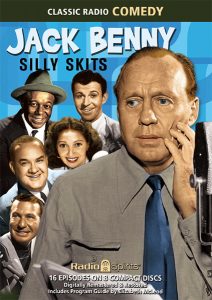 According to those familiar with the language, “Kitzel” is Yiddish for “tickle.” (Most appropriate!) But did Mr. Kitzel have a first name? Well, on a January 26, 1947 broadcast—in a spoof of the 1946 film Margie—much of the Benny cast figures in a childhood flashback, and Mr. K is introduced as “Sammy” Kitzel. (Hoo hoo hoooo!) Radio Spirits invites you to check out our extensive Jack Benny Show collections featuring the dialect talents of Artie Auerbach: Jack Benny vs. Fred Allen: Grudge Match, The Fabulous 40s, The Fabulous 50s, Tough Luck!, No Place Like Home, Planes, Trains, and Automobiles, Silly Skits, Jack Benny & Friends, and Wit Under the Weather.
According to those familiar with the language, “Kitzel” is Yiddish for “tickle.” (Most appropriate!) But did Mr. Kitzel have a first name? Well, on a January 26, 1947 broadcast—in a spoof of the 1946 film Margie—much of the Benny cast figures in a childhood flashback, and Mr. K is introduced as “Sammy” Kitzel. (Hoo hoo hoooo!) Radio Spirits invites you to check out our extensive Jack Benny Show collections featuring the dialect talents of Artie Auerbach: Jack Benny vs. Fred Allen: Grudge Match, The Fabulous 40s, The Fabulous 50s, Tough Luck!, No Place Like Home, Planes, Trains, and Automobiles, Silly Skits, Jack Benny & Friends, and Wit Under the Weather.

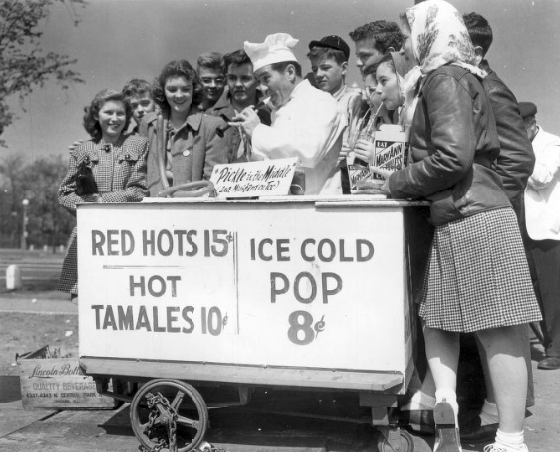

Artie was a friend of the family and married another friend, Cleo, when I was a very young girl. He was a kind, gentle, funny man who was always a part of my life for many years. I remember his 2nd wife, Doris, always wore Joy perfume. I loved it and have worn it ever since.His first wife, Cleo, was my friend from the time I was twelve years old. Those were wonderful years.